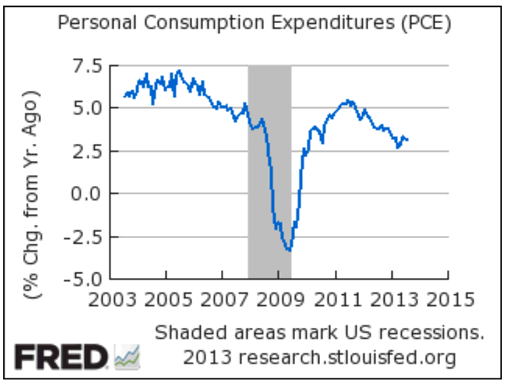Deep down, I suspect most of Congress believes what Rand Paul believes.
They believe balancing the budget is the right thing to do for our children and grandchildren.
And, of course, they have widespread popular support for a balanced budget and probably enough votes for a balanced budget amendment to the US constitution as well.
So maybe that’s why both sides are OK painting themselves into a corner.
There is no way out apart from one side completely losing face and credibility.
And when something can’t happen, sometimes it doesn’t happen, and we actually do go cold turkey into a balanced budget.
So what happens when the automatic fiscal stabilizers are disabled?
When the slowdown slows tax revenues, instead of the deficit going up as spending then exceeds revenues, spending is instead cut, which slows things down further, which means more spending cuts, which slows things down further, all the way to 0, as ‘balance’ combined with the fixed ‘demand leakages’ puts the system in ‘default’.
Said another way, the dollars to pay taxes and net save come from govt spending.
(You can’t do a reserve drain without a reserve add.)
With a balanced budget and automatic net savings/demand leakages, govt isn’t allowed to spend enough dollars to cover the tax bill.
And when taxes don’t get paid, spending is further constrained, so additional taxes can’t get paid, further restricting spending, etc. etc. etc.
So given our current institutional structure, the answer is yes, if we balance the budget and leave it that way, the world as we know it is definitely going to end.
(And with a bang, not a whimper.)
And given the policy of going cold turkey to balance probably does ‘sound like a pretty reasonable idea to the American public,’ it’s looking more and more like both sides are setting up to let it happen.
Massive deflationary bias in general
Sales and creditworthiness collapses
Major corps turn into Lehman and Bear Stearns
Bad for stocks
Bad for credit product
Good for the dollar (harder to get)
Good for US tsy secs (Fed low forever)
Blood in streets if allowed to persist
“It really is irresponsible of the president to try to scare the markets,” said Senator Rand Paul, Republican of Kentucky. “If you don’t raise your debt ceiling, all you’re saying is, ‘We’re going to be balancing our budget.’ So if you put it in those terms, all these scary terms of, ‘Oh my goodness, the world’s going to end’ — if we balance the budget, the world’s going to end? Why don’t we spend what comes in?”
“If you propose it that way,” he said of not raising the debt limit, “the American public will say that sounds like a pretty reasonable idea.”

